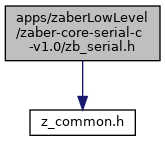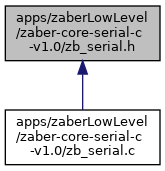Provides a set of functions for interacting with Zaber devices in the binary protocol. More...
#include "z_common.h"

Go to the source code of this file.
Functions | |
| int | zb_connect (z_port *port, const char *port_name) |
| int | zb_disconnect (z_port port) |
| int | zb_send (z_port port, const uint8_t *command) |
| int | zb_receive (z_port port, uint8_t *destination) |
| int | zb_encode (uint8_t *destination, uint8_t device_number, uint8_t command_number, int32_t data) |
| int | zb_decode (int32_t *destination, const uint8_t *reply) |
| int | zb_drain (z_port port) |
| int | zb_set_timeout (z_port port, int milliseconds) |
| void | zb_set_verbose (int value) |
Provides a set of functions for interacting with Zaber devices in the binary protocol.
Before using this library, it is recommended to read about the message format of the binary protocol. The manual can be found at the link below, as of November 2014:
http://www.zaber.com/wiki/Manuals/Binary_Protocol_Manual#Message_Format
Note especially that binary replies are sent when a command has finished as opposed to when the command was received. It is up to you to wait for appropriate responses to commands.
Definition in file zb_serial.h.
| int zb_connect | ( | z_port * | port, |
| const char * | port_name | ||
| ) |
Connect to a serial port specified by port_name.
Configures the port to the binary protocol defaults (9600 baud, 8N1). It is not recommended to use a device in binary at any other baud rate.
On Linux the port name will likely be something like "/dev/ttyUSB0", on Windows "COM1", and on OS X and BSD systems "/dev/cu.usbserial-A4017CQX". It is important that OS X/BSD systems use the "callout" (cu.* or cua.*) port as opposed to the "dial in" ports with names starting with tty.*, which will not work with Zaber devices.
If you are re-using a z_port, make sure to use zb_disconnect() to disconnect the old port before overwriting it with a new one.
| [out] | port | a pointer to a z_port to be written-over with the newly-connected port. |
| [in] | port_name | a string containing the name of the port to be opened. |
| int zb_decode | ( | int32_t * | destination, |
| const uint8_t * | reply | ||
| ) |
Decodes the last 4 bytes of a 6-byte (complete) reply.
This function wraps the last four bytes of the reply into a 32-bit integer matching the architecture of the compilation target (typically the machine which compiled the code, unless otherwise specified).
This function only writes the "data" portion of a reply (the last four bytes) into destination. You will still need to manually read the first two bytes of your reply to get the device and command IDs.
This function does not support the decoding of Message IDs. If your device does have Message IDs enabled, the data decoded by this function will be incorrect and should be considered undefined.
| [out] | destination | a pointer to a 32-bit integer to which to write the reply's data. |
| [in] | reply | a pointer to an array containing a 6-byte reply message. |
Definition at line 48 of file zb_serial.c.
References Z_ERROR_NULL_PARAMETER, and Z_SUCCESS.
| int zb_disconnect | ( | z_port | port | ) |
Gracefully closes a connection.
| [in] | port | the port to be disconnected. |
| int zb_drain | ( | z_port | port | ) |
Flushes all input received but not yet read, and attempts to drain all input that would be incoming.
This function is intended to be used when many commands have been sent without reading any responses, and there is a need to read a response from a certain command. In other words, call this function before sending a command whose response you would like to read if you have not been consistently reading the responses to previous commands.
This function will always take at least 100ms to complete, as it tries to read input until it is certain no more is arriving by waiting 100ms before deciding there is no more input incoming. Do not use it for time-sensitive operations, or in any kind of "chatty" setup, eg. multiple devices daisy-chained together with move tracking enabled. In such a setup, the only reliable way to retrieve any reply data is to always follow calls to zb_send() with calls to zb_receive().
| [in] | port | the port to drain. |
| int zb_encode | ( | uint8_t * | destination, |
| uint8_t | device_number, | ||
| uint8_t | command_number, | ||
| int32_t | data | ||
| ) |
Encodes a command according to Zaber's Binary Protocol Manual.
This function performs the necessary transposition of data bytes for transmission to Zaber devices using the binary protocol.
This function does not support the encoding of Message IDs.
| [out] | destination | a pointer to an array to which to write the encoded command. Assumed to be at least 6 bytes long. |
| [in] | device_number | the number of the device to which to send the command. |
| [in] | command_number | the number of the command to be sent. |
| [in] | data | the data to be sent along with the command. The contents of this field depend on the command number being sent. See the Binary Protocol Manual for info on specific commands. |
Definition at line 25 of file zb_serial.c.
References Z_ERROR_NULL_PARAMETER, and Z_SUCCESS.
| int zb_receive | ( | z_port | port, |
| uint8_t * | destination | ||
| ) |
Receives a message from the serial port.
Blocks while reading until 6 bytes have been read, or its timeout has elapsed. The default timeout is defined by READ_TIMEOUT, and can also be changed programmatically by zb_set_timeout().
The reply received will follow the message format specified in Zaber's Binary Protocol Manual. This means that the final 4 bytes received will be ordered from least to most significant. It is recommended to use zb_decode() to get the last 4 bytes of data as a convenient, well-formed 32-bit integer that matches your system.
Note that this function will simply read the first six bytes on the input buffer, whatever they may be. If you have sent many commands without receiving their corresponding replies, sorting them all out may be a real headache. Note also that this buffer is finite, and allowing it to fill up will result in undefined behaviour. See zb_drain() for a solution to this problem.
| [in] | port | the port to receive a message from. |
| [out] | destination | a pointer to which to write the reply read. Must be at least 6 bytes long. |
| int zb_send | ( | z_port | port, |
| const uint8_t * | command | ||
| ) |
Sends a command to a serial port.
It is recommended that before sending any commands, you read the Binary Protocol Manual to understand how these commands should be formatted (least-significant byte first). See zb_encode() for help encoding commands.
Note that this function does not typically crash if command is not six (or greater) bytes long: it will simply write the first six bytes found at the address command, whatever they may be. It is up to you to make sure that command is long enough.
| [in] | port | the port to which to send the command. |
| [in] | command | a string of bytes containing the command to be sent. |
| int zb_set_timeout | ( | z_port | port, |
| int | milliseconds | ||
| ) |
Change the duration zb_receive() will wait before timing out and returning without having read anything.
A Zaber device using the binary protocol will only respond once a command has been completed. Though we recommend users implement their own "wait" behaviour for commands they expect to take a long time, this function can be used to wait for such commands to complete before continuing execution.
A value of 0 for milliseconds will block indefinitely until a reply is received. Use with caution.
On *NIX systems, the value of milliseconds will be rounded up to the nearest tenth of a second (0.1s). This function returns the new timeout value to aid with compatibility between Windows and *NIX.
| [in] | port | the port whose timeout shall be changed. |
| [in] | milliseconds | the duration of the new timeout, in milliseconds. |
| void zb_set_verbose | ( | int | value | ) |
Sets whether errors and extra info are reported to stderr.
Set value to 0 to disable all output. Additionally, you can compile this library with the macro NDEBUG defined, which will disable all output and skip checks to "verbose" altogether in the compiled code.
| [in] | value | whether (1) or not (0) the program should output error messages and info to stderr. |
Definition at line 20 of file zb_serial.c.
References zb_verbose.